Cloud Atlas
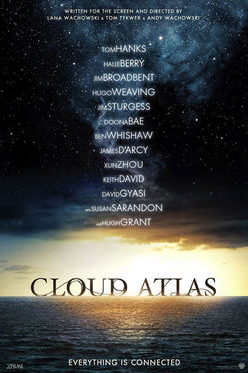
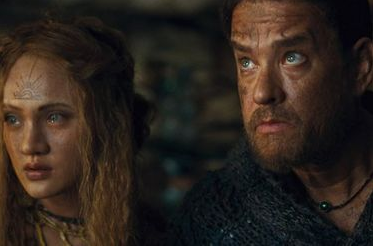 Based on the sprawling novel by David Mitchell, the movie covers six completely different stories set in different time periods, ranging from the 19th Century, to a distant future. The stories are not told in any sort of chronological order. In fact, they're constantly switching back and forth between the multiple plotlines. The effect is kind of like flipping back and forth between six different movies on different channels on TV. Sounds annoying, doesn't it? It should be, but for some reason, it never bothered me. The plots are not exactly complex to begin with. The tricky part at times is remembering who all the characters are, and what their relation is to each other. But, even then, it's not too big of a chore. The film's somewhat unfocused tone, and how it leaps from one plot and time period to the next at a moment's notice will probably annoy some. But, as a character states early in the film, "there's a method to the madness".
Based on the sprawling novel by David Mitchell, the movie covers six completely different stories set in different time periods, ranging from the 19th Century, to a distant future. The stories are not told in any sort of chronological order. In fact, they're constantly switching back and forth between the multiple plotlines. The effect is kind of like flipping back and forth between six different movies on different channels on TV. Sounds annoying, doesn't it? It should be, but for some reason, it never bothered me. The plots are not exactly complex to begin with. The tricky part at times is remembering who all the characters are, and what their relation is to each other. But, even then, it's not too big of a chore. The film's somewhat unfocused tone, and how it leaps from one plot and time period to the next at a moment's notice will probably annoy some. But, as a character states early in the film, "there's a method to the madness".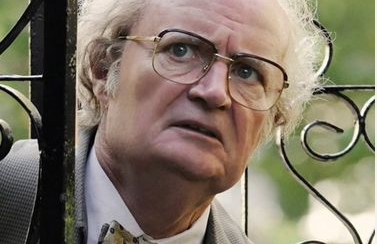 The first story is set on a 19th Century ship making its way across the Pacific Ocean, and centers on a relationship that builds between an upper class white man (Jim Sturgess), and an escaped black slave (David Gyasi), who is hiding below the decks of the ship, and hopes for safe passage. Next, we're taken to 1931 Belgium, where the story of a young hopeful musician (Ben Whishaw) unfolds, and how he is taken under the wing of a brilliant, aging classical composer (Jim Broadbent), who is working on his masterpiece. Then, we get a 1970s-style conspiracy crime thriller, where a journalist named Luisa Rey (Halle Berry) uncovers a plot by an evil oil executive (Hugh Grant) to illegally broaden his business, and finds herself on the run from mysterious assailants trying to kill her. The fourth story lightens things up a little, and is a mostly comedic tale of a publisher (Jim Broadbent again) who finds himself on the run from thugs when his latest book becomes a runaway best seller. His brother (Hugh Grant again) tells him of a place where he can lie low, which just so happens to be a retirement home, run by a very strict staff, including a Nurse Ratched wannabe (Hugo Weaving in drag).
The first story is set on a 19th Century ship making its way across the Pacific Ocean, and centers on a relationship that builds between an upper class white man (Jim Sturgess), and an escaped black slave (David Gyasi), who is hiding below the decks of the ship, and hopes for safe passage. Next, we're taken to 1931 Belgium, where the story of a young hopeful musician (Ben Whishaw) unfolds, and how he is taken under the wing of a brilliant, aging classical composer (Jim Broadbent), who is working on his masterpiece. Then, we get a 1970s-style conspiracy crime thriller, where a journalist named Luisa Rey (Halle Berry) uncovers a plot by an evil oil executive (Hugh Grant) to illegally broaden his business, and finds herself on the run from mysterious assailants trying to kill her. The fourth story lightens things up a little, and is a mostly comedic tale of a publisher (Jim Broadbent again) who finds himself on the run from thugs when his latest book becomes a runaway best seller. His brother (Hugh Grant again) tells him of a place where he can lie low, which just so happens to be a retirement home, run by a very strict staff, including a Nurse Ratched wannabe (Hugo Weaving in drag).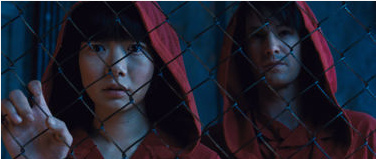 The last two stories are set in the distant future, and hold the most fascinating visuals. In the fifth, a genetically engineered woman created solely to serve customers in a cafe (Doona Bae) learns the truth about her kind, her purpose, and the world she lives in when a revolutionary fighting for a free society rescues her, and shows her what the world is really like. Inspired by what she sees and learns, she begins thinking for herself for the first time, and becomes a rallying figure for the revolutionaries. The final story is set even further in the future, where Earth has become a primitive world, and a simple goat herding tribesman (Tom Hanks) agrees to help a woman from a technologically advanced society (Halle Berry again) on her mission to uncover secrets of the past.
The last two stories are set in the distant future, and hold the most fascinating visuals. In the fifth, a genetically engineered woman created solely to serve customers in a cafe (Doona Bae) learns the truth about her kind, her purpose, and the world she lives in when a revolutionary fighting for a free society rescues her, and shows her what the world is really like. Inspired by what she sees and learns, she begins thinking for herself for the first time, and becomes a rallying figure for the revolutionaries. The final story is set even further in the future, where Earth has become a primitive world, and a simple goat herding tribesman (Tom Hanks) agrees to help a woman from a technologically advanced society (Halle Berry again) on her mission to uncover secrets of the past.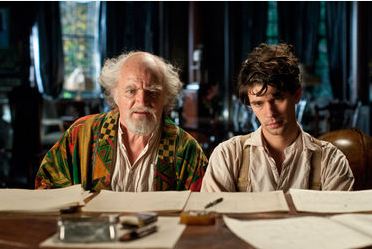 The main connecting factor in all of these stories can sometimes be something as simple as a character uncovering a letter from another time or place. Or, since its large cast end up usually playing upwards to 5 or 6 characters in these different stories (Tom Hanks plays not only the futuristic tribesman, but also a scheming doctor on the 19th Century ship, and a violent thug in another story), sometimes it is hinted that these characters are reincarnated into different lives and time periods. It sounds complicated, but I believe the real way to enjoy Cloud Atlas is to just follow the stories while you are watching them, and then do all your thinking and analyzing afterward. That way, you won't miss anything, and you also won't be overthinking or looking for threads or connections that are not really there. This is a movie that deserves to be savored for its visuals, performances, and ideas to begin with. Thinking too much while watching the film may cause to miss some of its simpler pleasures.
The main connecting factor in all of these stories can sometimes be something as simple as a character uncovering a letter from another time or place. Or, since its large cast end up usually playing upwards to 5 or 6 characters in these different stories (Tom Hanks plays not only the futuristic tribesman, but also a scheming doctor on the 19th Century ship, and a violent thug in another story), sometimes it is hinted that these characters are reincarnated into different lives and time periods. It sounds complicated, but I believe the real way to enjoy Cloud Atlas is to just follow the stories while you are watching them, and then do all your thinking and analyzing afterward. That way, you won't miss anything, and you also won't be overthinking or looking for threads or connections that are not really there. This is a movie that deserves to be savored for its visuals, performances, and ideas to begin with. Thinking too much while watching the film may cause to miss some of its simpler pleasures. Of course, given its multi-plot structure, we get to the movie's key problem, which is that it is very inconsistent. Not enough to harm my enjoyment of the film, mind you, but I did definitely find myself enjoying some of the tales more than others. Of the different stories, I found the story about the publisher and the nursing home to be the most entertaining on a basic level, due to the fact that it's essentially a giant farce, and offers some well-needed comic relief, given how serious and dire some of the other stories in the film can get. I also enjoyed the story of the genetically engineered woman in the futuristic society that owes more than a little debt to Blade Runner. Not only is it the strongest story visually, but it's also probably the most emotional and touching. The 70s conspiracy crime thriller with Halle Berry in the lead was also a winner, and did a good job emulating the film genre it was going after.
Of course, given its multi-plot structure, we get to the movie's key problem, which is that it is very inconsistent. Not enough to harm my enjoyment of the film, mind you, but I did definitely find myself enjoying some of the tales more than others. Of the different stories, I found the story about the publisher and the nursing home to be the most entertaining on a basic level, due to the fact that it's essentially a giant farce, and offers some well-needed comic relief, given how serious and dire some of the other stories in the film can get. I also enjoyed the story of the genetically engineered woman in the futuristic society that owes more than a little debt to Blade Runner. Not only is it the strongest story visually, but it's also probably the most emotional and touching. The 70s conspiracy crime thriller with Halle Berry in the lead was also a winner, and did a good job emulating the film genre it was going after.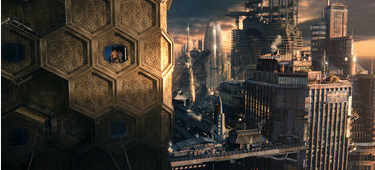 Less successful is the final story, about the primitive futuristic Earth. It never really grabbed my attention, and the dialogue is sometimes hard to understand. I thought it might have been just me, but other audience members and critics have echoed my frustration, so I'm not sure what went wrong there. This does lead to an overall slightly disjointed experience, but it is still thrilling, nonetheless. There is always some idea, some visual, or some performance that you can focus on, even if something else is not working. Does this make Cloud Atlas flawed? Absolutely. But that does not detract from the overall experience of the film itself, which successfully manages to not only tell these massive stories in a manner that does not feel rushed or cut short, but does so in a mature way. The movie does not feel dumbed down, nor does it drown itself in endless exposition to explain everything. We're often thrown into these stories head-first, and left to our own devices to figure out what they're about, and what direction they're going to take. This leads not only to some surprises, but also an overall sense that the movie respects the intelligence of its audience.
Less successful is the final story, about the primitive futuristic Earth. It never really grabbed my attention, and the dialogue is sometimes hard to understand. I thought it might have been just me, but other audience members and critics have echoed my frustration, so I'm not sure what went wrong there. This does lead to an overall slightly disjointed experience, but it is still thrilling, nonetheless. There is always some idea, some visual, or some performance that you can focus on, even if something else is not working. Does this make Cloud Atlas flawed? Absolutely. But that does not detract from the overall experience of the film itself, which successfully manages to not only tell these massive stories in a manner that does not feel rushed or cut short, but does so in a mature way. The movie does not feel dumbed down, nor does it drown itself in endless exposition to explain everything. We're often thrown into these stories head-first, and left to our own devices to figure out what they're about, and what direction they're going to take. This leads not only to some surprises, but also an overall sense that the movie respects the intelligence of its audience.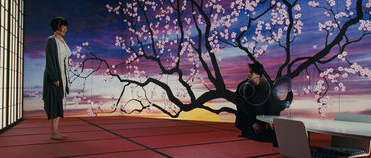
See the movie times in your area or buy the DVD at Amazon.com!






0 Comments:
Post a Comment
<< Home